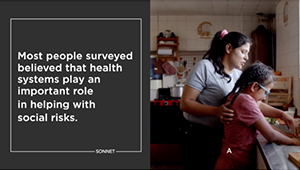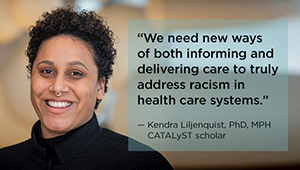Identifying patients in need of social support services

A new predictive model helps connect adults with multiple chronic health conditions to community services
Managing multiple health conditions can be challenging. Add on food insecurity, financial stress, transportation barriers, and housing instability, and it can be even harder for patients to stay on top of their medical appointments and medications. To improve these patients’ care, Kaiser Permanente researchers developed a tool to help identify adults who may have these social risks and who may benefit from direct social screening outreach and referral to community programs for assistance.
Adults with multiple chronic health conditions — often referred to as medically complex patients — account for the majority of health expenditures in the U.S., said lead researcher Richard Grant, MD, MPH, a senior research scientist at the Kaiser Permanente Division of Research.
“In addition to their medical issues, many of these patients also have social barriers to care,” said Grant, who is also The Permanente Medical Group regional director of research and evaluation for complex needs. “People with heart failure and diabetes who can’t afford healthy food or don’t have a home to keep food in, are going to have more problems managing their diabetes and heart disease. Part of managing these chronic diseases is connecting patients to community services that can help them stay on top of their medical care.”
For the study, published in Medical Care, the research team collected information from the electronic health records of nearly 12,000 Kaiser Permanente Northern California members with 2 or more chronic health conditions. The researchers also used public census data to link each patient’s address to neighborhood measures of social insecurity. About 40.6% of these patients self-reported experiencing food insecurity, financial stress, or housing instability.
The research team’s goal was to develop a model that could be used to predict the likelihood that an adult with 2 or more chronic health conditions would answer “yes” to a question asking them about food insecurity, financial distress, or housing instability.
They found that a model that included 30 variables — factors such as age, sex, ZIP code, smoking status, current diagnoses, a recent move to lower-income neighborhood, past hospitalizations, medications used, and the need for a wheelchair or other medical equipment — had 68% accuracy across racial and ethnic groups.
Next, they validated the model in a randomly selected group of 2,820 adult Kaiser Permanente Northern California members with 2 or more chronic health conditions who completed a survey used in a separate observational study about social barriers to health.
“Federal agencies have increasingly recognized that health outcomes are tied to patients’ social needs,” said coauthor James Ralston, MD, MPH, a senior investigator at Kaiser Permanente Washington Health Research Institute. “Using a prediction model like this in our large patient population can help us proactively reach out to many of the patients who are most likely to benefit from our care.”
The predictive model, which is now used at Kaiser Permanente Northern California, is on track to be integrated into medical systems in other Kaiser Permanente regions.
Future research, the authors said, should focus on the best way to implement interventions once patients have been identified as in need of social support as well as the impact on health outcomes of referrals to community agencies.
“Our study shows that there is extensive information that we can access within our electronic health record system that can tell us which individuals may have higher social risks,” said co-author Elizabeth Bayliss, MD, MSPH, a senior investigator at the Kaiser Permanente Colorado Institute for Health Research. “Understanding patients’ potential needs will allow us to offer community support services to the adults who need it most.”
The study was funded by the Agency for Healthcare Research and Quality.
Coauthors include Jodi McCloskey, MPH; Connie Uratsu, RN, MS, PHN; and Dilrini Ranatunga, MPH, of the Division of Research; and Oleg Sofrygin, PhD, formerly of the Division of Research.
This has been adapted from a news story written by Sue Rochman for the Kaiser Permanente Division of Research.
SONNET study

Social risks: Do patients want health systems to help?
New research led by Leah Tuzzio, MPH, looks at patients’ unmet social risks and their desire for assistance.
News

A call for stronger focus on health equity in learning health systems training
Early-career scientists provide steps to a more equitable future.
Healthy findings blog

What works to meet complex needs in diabetes care?
An ACT Center partnership is helping a nonprofit engage patients and provide comprehensive care.



